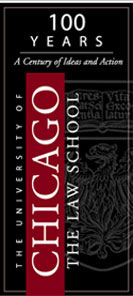|
I believe it was the great English legal historian, Frederic Maitland,
who said that “taught law is tough law.” If the endurance
of things taught is the measure of the quality of a legal education,
the University of Chicago Law School in the late 1940’s
was a very special place. More than half a century after I attended
the Law School, things that I learned and the memory of many of
the professors with whom I studied remain fresh in my mind.
The Law School – like the rest of the University
– has always had a strong commitment to excellence in teaching.
There were many superlative teachers in the Law School in my time.
I have vivid memories of my first week in the Law School in September
1946, and especially of the course in “The Elements of the
Law” taught by Edward Levi. Levi was a magnificent teacher;
he was intellectually exciting, a master of the Socratic method,
impatient with slipshod thinking, and challenging. I can still
recall his probing discussion of the theory of justice in Plato’s
Republic. Several years later, I was a student in the antitrust
course Levi taught together with Aaron Director, one of the pioneering
courses in law and economics.
Malcolm Sharp’s course in contracts was another
highlight of my first year. Sharp was a soft-spoken, highly cultivated
and erudite man, and his teaching reflected his immense knowledge
of economics, psychology, semantics and literature. His course
in contracts was a liberal education.
My Bigelow tutor in legal research and writing was
Harry Kalven. He was highly literate with a broad range of interests,
and he was a warm and supportive person. I remember him with affection
and great regard. Years later, I read some of Kalven’s elegantly
written essays on freedom of speech; they are among the most perceptive
papers on the subject that I have ever read.
Two other professors whom I remember well were Walter Blum and
Wilber Katz. Both were teachers of exceptional capabilities. Both
had an uncommon gift for making complex matters lucid and intelligible.
The introductory part of the course in corporations that Katz
taught was devoted to accounting. I did not look forward to it,
but Katz made it fascinating.
In my second and third years, I was privileged to
take courses in constitutional law and federal jurisdiction with
William Winslow Crosskey. Crosskey’s courses were not just
courses in constitutional law; they were courses in history and
historical methodology, in rhetoric and critical analysis, in
politics and government. I count Crosskey as one of the greatest
legal scholars of the last fifty years. Around 1953, I met John
W. Davis, for whom Crosskey had clerked on Wall Street when he
was a young man. Davis told me – and I agree with him –
that Crosskey’s brain was the best piece of legal equipment
he had ever encountered. Years later, in reflecting on Crosskey’s
life and work, I came to the realization that I admired him not
only for the remarkable books he had written, but particularly
because of his moral courage. He persisted in his work, notwithstanding
a torrent of criticism, because he believed he was right. Crosskey
was a great man.
I have mentioned distinguished professors. There
was also an exceptionally interesting group of students at the
school in the late 1940’s. Many were veterans of World War
II. My legal education was greatly enriched by them, and a number
of them became life-long friends.
|



